|
|
|
Sort Order |
|
|
|
Items / Page
|
|
|
|
|
|
|
| Srl | Item |
| 1 |
ID:
174212
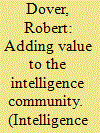

|
|
|
|
|
| Summary/Abstract |
Reviews of intelligence failures have recommended greater use of external expertise in challenging intelligence community assessments. External contributions were expected to augment covert collection and to provide open-source challenge to analysts, rather than to directly contribute to decision support. The structural limitations of the scope and machinery of intelligence have limited the value agencies can extract from external experts. Creating an Open-Source Intelligence Agency of commensurate size to primary intelligence organisations would enable decision support to be provided to all government departments. It would widen the pool of sources and experts, providing for greater extraction of value from experts who are only partially included in this government activity.
|
|
|
|
|
|
|
|
|
|
|
|
|
|
|
|
| 2 |
ID:
106607
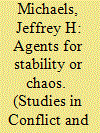

|
|
|
|
|
| Publication |
2011.
|
| Summary/Abstract |
Recent discussions among U.S. officials about how the intelligence community can demonstrate its "relevance" to counterinsurgency have been dominated by an ideology that presupposes large-scale military intervention, and in which the role of intelligence is limited to improving analysis in support of current military activities, with little debate of future requirements. This article will highlight a number of alternative conceptions of intelligence "relevance" to counterinsurgency, based on a study of several historical and contemporary U.S. and non-U.S. cases, and by applying a wider definition of counterinsurgency that includes cases where the military plays a subordinate role relative to the intelligence services.
|
|
|
|
|
|
|
|
|
|
|
|
|
|
|
|
| 3 |
ID:
124117
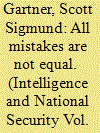

|
|
|
|
|
| Publication |
2013.
|
| Summary/Abstract |
Strategic situations create motivational biases that help to predict the type of errors intelligence communities are more likely to commit (Type I errors predict behavior never observed, while Type II errors fail to predict behavior later observed). When the dangers of inaction are low and the cost of action high, the intelligence community is more likely to fail to predict threats (Type II error). If the dangers of inaction are high and the costs of military action low, it is more likely to predict mistakenly threats never observed (Type I error). Studies of US and Israeli decision-making and analyses of two new experimental studies support this theory. The key is to recognize the incentives for error and to develop systems that, at worst, lead to intelligence errors (mistakes consistent with a state's national security needs) and not intelligence failures (errors contrary to national security requirements).
|
|
|
|
|
|
|
|
|
|
|
|
|
|
|
|
| 4 |
ID:
104713
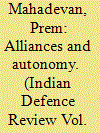

|
|
|
| 5 |
ID:
171238
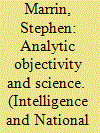

|
|
|
|
|
| Summary/Abstract |
Analytic objectivity as a standard for the US Intelligence Community appears to have been drawn from idealized conceptualizations of the scientific method as a kind of value-neutral epistemological framework used to develop knowledge “objectively.” But this embrace of objectivity provides a poor foundation for contemporary conceptualizations of the applied epistemology of intelligence analysis, as well as performance standards. Instead, intelligence analysts should embrace a more realistic goal of aspiring to but never actually achieving analytic objectivity through the reduction of subjectivity while embracing the values of honesty, neutrality, and integrity encapsulated in the phrase “calling it as you see it”.
|
|
|
|
|
|
|
|
|
|
|
|
|
|
|
|
| 6 |
ID:
131106
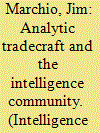

|
|
|
|
|
| Publication |
2014.
|
| Summary/Abstract |
The emphasis and visibility afforded analytic tradecraft in the Intelligence Community's analytic production has fluctuated throughout its existence. The explanation for this intermittent emphasis on tradecraft may lie in changes in consumer preferences and collection means, the role played by individual tradecraft advocates, and the lack of an intelligence failure matching the severity of 9/11 and the absence of weapons of mass destruction in Iraq. Both failures served as a forceful reminder that while strong analytic tradecraft does not guarantee 'getting a judgment right', it increases the likelihood that the assessments produced are transparent, relevant, and rigorous.
|
|
|
|
|
|
|
|
|
|
|
|
|
|
|
|
| 7 |
ID:
116159
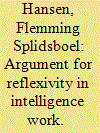

|
|
|
|
|
| Publication |
2012.
|
| Summary/Abstract |
In general, so it is argued in this article, the intelligence community would benefit from an agenda of greater and more conscious reflexivity. This increased self-awareness should as a minimum be applied to the areas of collection, analysis and communication, and it should bring members of the intelligence community to habitually reassess both procedures and standards of their work. Such a process promises to improve analysis, reduce misunderstandings in communication and increase public trust in the intelligence community. It will, in short, help the intelligence community prepare for a turbulent future.
|
|
|
|
|
|
|
|
|
|
|
|
|
|
|
|
| 8 |
ID:
151792
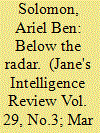

|
|
|
| 9 |
ID:
143757
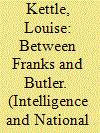

|
|
|
|
|
| Summary/Abstract |
Lessons for the intelligence community were publicly identified in a 1983 report by Lord Franks and a 2004 report by Lord Butler. However, little is known of the lessons learned during the 20 years between the two. This article draws upon two newly released, previously classified, documents which examine British intelligence lessons from the 1990–91 Gulf War. It provides a previously untold account of the crisis, exclusively from a British intelligence perspective, and presents new evidence that intersects across many intelligence debates. This article also challenges whether identified lessons remained learned and begins to question the wider learning process within the intelligence community.
|
|
|
|
|
|
|
|
|
|
|
|
|
|
|
|
| 10 |
ID:
186403
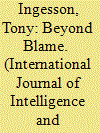

|
|
|
|
|
| Summary/Abstract |
Investigations into intelligence failures are frequently conducted by multiple parties in parallel, and in several important cases, their conclusions have been controversial. In addition, investigations into minor incidents, such as mishandling of sensitive information or equipment, tradecraft errors, or similar events where no major consequences have been detected, tend to be handled internally by the concerned agency, or through limited interagency cooperation. This can lead to missed opportunities to prevent them from developing into major failures. These issues are compared to the investigative procedures employed in the aviation safety sector, where an independent body is responsible for investigating both major failures and minor incidents, with a view specifically to develop proactive measures to prevent repetition. The conclusion presented is that the Intelligence Community could benefit from studying how aviation safety investigations are handled, in order to be more effective in addressing minor incidents at an early stage, and to avoid controversies in investigations of major events.
|
|
|
|
|
|
|
|
|
|
|
|
|
|
|
|
| 11 |
ID:
174214
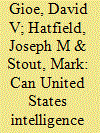

|
|
|
|
|
| Summary/Abstract |
This article argues that United States Intelligence Community analysts can and should periodically telework as routine professional development and as a research supplement to traditional all-source intelligence analysis. We offer four key benefits to tapping into this reservoir of unclassified information that would improve the quality of the intelligence product, enable better liaison and academic exchange, and steward the profession. We conclude that an overdue rebalancing of classified and publicly available sources could be aided by telework, but only once analysts break free from ‘the cult of the SCIF’ will publicly available information receive the analytical attention that it deserves.
|
|
|
|
|
|
|
|
|
|
|
|
|
|
|
|
| 12 |
ID:
134901
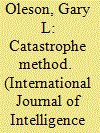

|
|
|
|
|
| Summary/Abstract |
The budget reductions being imposed on both the military and intelligence communities will result in greater risk from emerging or concealed threats as information about such threats declines along with Washington's abilities to respond to them. The decline in intelligence expenditures, in particular, increases the likelihood that serious threats will evade detection and identification. A potential adversary could suddenly present the United States with a long-duration threat to its electrical grid or a crippling blow to its overseas force projection. Failure to look for such concealed threats is a formula for unacceptable strategic surprise. Since the natural tendency of intelligence operations is to focus available resources on known threats, looking for concealed threats is as much a challenge to resource allocation as search methodology. Both challenges can arguably be addressed by focusing on the most intolerable of potential consequences: national catastrophes.
|
|
|
|
|
|
|
|
|
|
|
|
|
|
|
|
| 13 |
ID:
107252
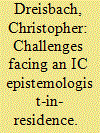

|
|
|
| 14 |
ID:
099124
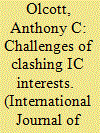

|
|
|
| 15 |
ID:
082623
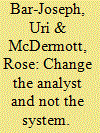

|
|
|
|
|
| Publication |
2008.
|
| Summary/Abstract |
Recent intelligence failures, including first and foremost the mistaken estimate of Iraq's weapons of mass destruction (WMD) prior to the war, show that a prime source of such failures is the adherence by analysts to preconceptions (or mind-sets) which entail the rejection of new information that contradicts it. The source of this kind of problem lies in well known psychological mechanisms. Yet official investigations into intelligence blunders have typically ignored this problem or have not suggested an appropriate solution thus far. Our paper suggests an original approach based on the fact that certain types of personalities are more likely than others to fall victim to these biased judgments. Existing psychological tests can help determine individual susceptibility to such tendencies. Therefore we suggest that intelligence organizations should pay far more attention to these personality characteristics, especially an analyst's level of openness, in recruitment, training, and promotion. Such attention would help create more effective reforms in intelligence than organizational models which advocate "devil's advocate" kind of solutions.
|
|
|
|
|
|
|
|
|
|
|
|
|
|
|
|
| 16 |
ID:
121990
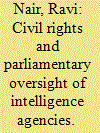

|
|
|
| 17 |
ID:
123178
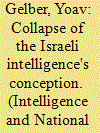

|
|
|
|
|
| Publication |
2013.
|
| Summary/Abstract |
This article attempts to contradict the commonly accepted assumption in Israel and the West that in April-May 1973 Egypt and Syria were about to open war against Israel and were deterred by a series of measures that Israel took, including partial mobilization of the Israel Defence Force (IDF) reserves. The article ventures to separate the apologetics and (flawed) memories from the information provided by the now available documentary evidence. After presenting the prevailing Israeli version, the article analyses the memoirs on the Egyptian side about the preparations for war and determining D-Day, to refute this version. Based on the contemporary protocols of government and general staff meetings and political-military consultations, it argues that the Israeli government, general staff and intelligence community did not regard at the time the outbreak of war as an imminent threat. The steps they took concerned the medium and long run, and were irrelevant in the short run. Similarly, the mobilization of reserves was not connected to the alarm of war but to the Day of Independence parade in Jerusalem. The article claims on the basis of these protocols that the reason for the excitement was the collapse of the Israeli intelligence's conception that Egypt would not resume hostilities before it could hit at the interior of Israel, and Syria would not go to war without Egypt. The arrival of Libyan Mirages and Iraqi Hunters to Egypt in April fulfilled this condition and the possibility of war could not be dismissed offhand. Israel responded to the new situation by the book. It shared the information and analysis with the White House and the CIA; it refreshed the IDF planning down to the divisional level and the IDF general staff held a series of thorough discussions to estimate the situation. The bottom line of this process was a government directive to the IDF to prepare for war at the end of the summer of 1973 (as it actually happened). In the latter portion of the article I explain why this directive was ignored when it was put to test in late September and early October of 1973.
|
|
|
|
|
|
|
|
|
|
|
|
|
|
|
|
| 18 |
ID:
132420
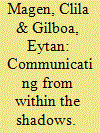

|
|
|
|
|
| Publication |
2014.
|
| Summary/Abstract |
Communicating with the media is an ongoing complicated task intelligence services tackle from the day they are established. The relationship is inherently tense because one side wishes to reveal what the other wishes to conceal, highlighting the constant contradiction between two major principles: the public's right to know versus the government's duty to protect national security. Reconciling these two principles becomes exceedingly complex during crisis situations because both the media and the public demand to know what is happening and why, whereas intelligence services can offer only limited and often incomplete information, a limitation imposed by the need to protect vital secrets. Moreover, the services frequently face a quandary: they are innately secretive and cannot advertise their accomplishments and successes, but these are commonly exposed when they fail. This distorts the natural balance other organizations are generally able to maintain between failures and achievements and any publicity about them.
|
|
|
|
|
|
|
|
|
|
|
|
|
|
|
|
| 19 |
ID:
128788
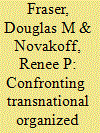

|
|
|
| 20 |
ID:
091230
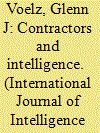

|
|
|
|
|
| Publication |
2009.
|
| Summary/Abstract |
At this juncture ongoing military operations and growing demand for domestic counterterrorism information will likely necessitate continuing reliance on private sector augmentation into the foreseeable future. Given this assumption, the time has arrived for the government to move beyond viewing its commercial augmentation as an ad hoc resource without having clear strategies and policy for its use.
|
|
|
|
|
|
|
|
|
|
|
|
|
|
|
|
|
|
|
|
|